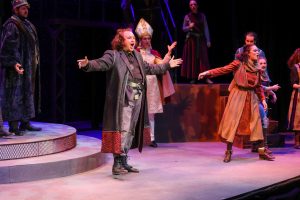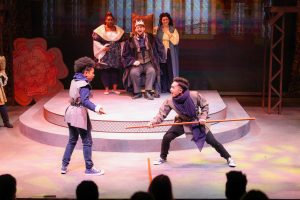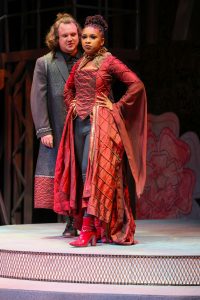
By Dale King
It’s encouraging to see that drama students at Florida Atlantic University haven’t lost their interest in performing plays written several centuries ago, despite interruptions wrought in FAU’s theatrical schedule by COVID-19.
The energetic performers in FAU’s Department of Theatre and Dance wrapped up the 2021-22 season with a formidable performance of William Shakespeare’s savage history play, Richard III. The enviably presented season finale concluded last weekend after opening to sparse audiences during the holiday period of Passover and Easter.
Directed by Lynn McNutt, and displaying some of fight choreographer Lee Soroko’s most brilliant moves, Richard III’s cast featured some stellar performances such as Steve Harding’s ruthless representation of the killer king, Eric Frederickson’s interpretation of the courageous but ultimately doomed Buckingham, Stephanie Young’s depiction of the true-to-the-bitter end lieutenant, Ratcliffe, and Noelle Nicholas’s portrayal of Queen Elizabeth, which excellently captured her emotional moods and bouts with angst.
A vast cast – and an even more vast artistic and production crew – pulled together an admirable performance of one of the Bard’s lengthiest works at the Marleen Forkas Studio One Theater on the Boca Raton campus. While the play runs more than three hours in full, FAU’s version pared it down to a more manageable 90 minutes or so.
The plot is complicated. The drama is set amid the lengthy war between two factions of the ruling Plantagenet family – the Lancasters and Yorks. The conclusion of the aptly dubbed War of the Roses (named for the floral symbols of the two family segments, red for the Lancasters, white for the Yorks) eventually decided the fate of the English throne for many years to come.

Students moved the action along by speaking directly to the audience with occasional play summaries to help viewers understand what’s happening. Performers also used lineage charts posted on easels to explain the relationships between the many denizens of the lengthy war (those charts are also in the programs).
The current performance quickly introduces Richard of Gloucester, the jealous, humpbacked king-wannabe who desires the English throne more than life itself and uses manipulation and deceit to achieve his goal. Along the way, he murders his brother and nephews and either fights or marries anyone opposed to his becoming King Richard III.
The FAU production didn’t lean on Richard’s disabilities, as Shakespeare and some other theaters have done. Harding’s top-notch performance as the unscrupulous duke more than established his multitude of evils and basic sin-filled nature.
The addition of some contemporary storytelling touches – including a slow-motion battle scene on Bosworth Field that underscores the violence and ferocity of King Richard’s deadly clash – enlivened a production that is largely a war of words.
Richard III follows the events portrayed in Shakespeare’s Henry VI, Part 3. Richard of Gloucester, the brother of King Edward IV, is determined to gain the crown of England for himself, no matter what. Along the way, he revels in the death by illness of brother Edward (Gus Garcia) and orchestrates the demise of another sibling to ensure his path to the throne.

In the meantime, he romantically pursues Lady Anne (Djimon Armani) – even though he killed her husband. She initially resists – to the point of spitting on the nasty suitor. He retorts that her lips are for kissing, not spitting. Eventually, she accepts his advances and becomes Duchess of Gloucester.
To further his plot, Richard confines his nephews in the Tower of London and ends up murdering them. Buckingham assists – and later offers a hearty “Long live King Richard” during the new monarch’s installation – a cheer he regrets later.
Director McNutt offers a pithy assessment of the play without divulging the resolution. “Like most storytellers, Shakespeare bends the facts to give us a dynamic cast of characters, fun plot twists, nail-biting intrigue and medieval battles.”
The show was entertaining on several levels. Not only did the cast speak in virtually flawless Elizabethan English, they performed on a stage that’s an exceptional recreation of a Shakespearean village, thanks to the many artisans and production folks who spent the better part of six weeks preparing it.